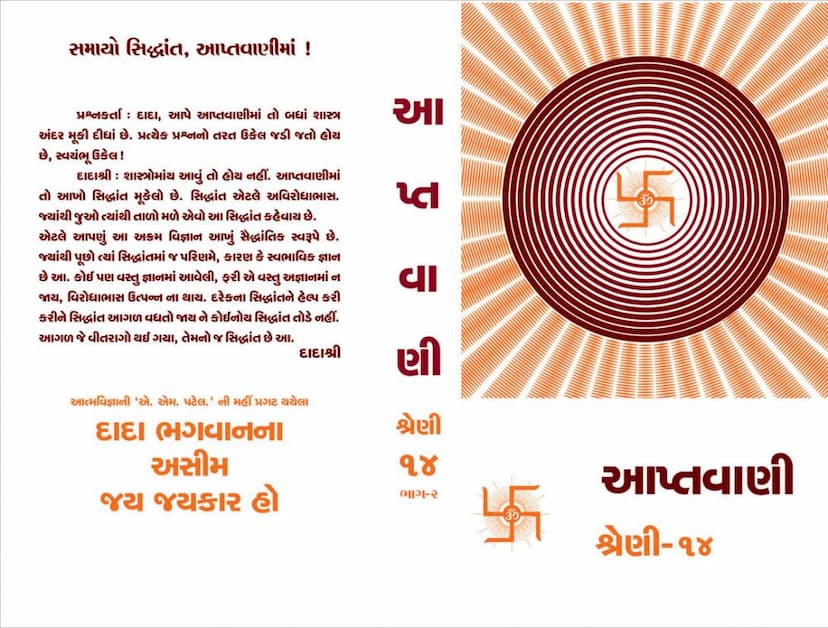Aptavani 14 Part 2
Added to library: September 1, 2025

Summary
Here's a summary of Aptavani 14 Part 2 by Dada Bhagwan, covering the key themes and concepts discussed in the provided text:
Overall Theme:
Aptavani 14 Part 2, as part of the Aptavani series, delves into the profound philosophical and scientific principles of Jainism as explained by Dada Bhagwan. This particular volume focuses on the nature of the six eternal elements that constitute the universe and the intricate workings of atoms and matter (Pudgal). The text emphasizes that true spiritual understanding comes from direct experience and knowledge, not just intellectual comprehension.
Key Concepts and Themes:
-
The Six Eternal Elements: The text explains that the entire universe is composed of six eternal elements:
- Soul (Atma): The pure consciousness, the seer, the knower, inherently blissful and powerful. It is the only sentient element.
- Matter (Pudgal): The only material element, perceivable by the senses, possessing qualities like form, taste, smell, and touch. It is the basis of all physical forms.
- Motion (Dharmastikaya): The principle that facilitates motion.
- Rest (Adharmastikaya): The principle that facilitates rest or stability.
- Space (Akasha): The principle that provides space or accommodation for all other substances.
- Time (Kala): The principle that causes change and evolution.
-
The Nature of Reality (Real vs. Relative): The text differentiates between the eternal, unchanging reality (the elements themselves) and the relative, ever-changing manifestations (avosthas) that are perceived by the senses. True knowledge is of the eternal elements, not just their temporary forms.
-
The Role of Pudgal (Matter): Pudgal is highlighted as a significant and active element. It is described as the sole material element, responsible for the physical world's formations. The text elaborates on its various states and interactions:
- Atoms (Paramanu): The fundamental, indivisible units of Pudgal.
- Molecules (Anu/Skandh): Combinations of atoms.
- Puran-Galan: The continuous process of formation and dissolution inherent in Pudgal.
- Pudgal's Active Nature: Pudgal is described as inherently active and capable of transformation, driven by its own nature and in conjunction with the Soul's impulses.
-
The Soul (Atma): The Soul is characterized as pure consciousness, eternal, unchanging, and inherently blissful and powerful. It is distinct from matter and other elements. The text emphasizes that the Soul's true nature is often obscured by the "wrong beliefs" (mithyatva) and the influence of Pudgal.
-
The "I Am" and "Mine" Illusion: A significant focus is placed on the illusion of "I" and "mine" that binds the Soul to Pudgal. The Soul, in its pure state, is beyond these worldly attachments. The text suggests that by realizing the true nature of the Self as distinct from Pudgal, liberation (moksha) can be attained.
-
The Six Elements as Partners in the Worldly Drama: The interaction of the six elements is described as a partnership or a business venture, where each plays its role. The Soul, initially a supervisor, mistakenly becomes the owner, leading to conflicts and the cycle of birth and death. The ultimate resolution lies in the Soul returning to its role of pure awareness.
-
Space (Akasha) and its Significance: Space is described as a crucial element that accommodates all other substances and is eternal. It is also highlighted as a factor influencing individual experiences and perceptions due to the distinct "space" each being occupies.
-
Time (Kala): Time is explained as a subtle element (Kalānu) that governs change and the sequence of events. While the eternal elements are beyond time, their manifestations are subject to its influence.
-
The Importance of Understanding, Not Just Ritual: The text stresses that knowing these scientific principles is important, but the ultimate goal is liberation. The five commandments of Dada Bhagwan are presented as the practical path to this.
-
The Nature of Knowledge and Perception: The text distinguishes between intellectual knowledge and experiential knowledge. True understanding of the Self and the elements comes from direct, enlightened perception, not just bookish knowledge.
Overall Message:
Aptavani 14 Part 2 aims to provide a clear, scientific, and experiential understanding of the fundamental principles of existence according to Dada Bhagwan's teachings. It encourages readers to move beyond the limitations of the intellect and the senses to directly perceive the Self and its relationship with the eternal elements, ultimately leading to liberation. The text emphasizes that the Self is pure, eternal, and untouched by the transformations of the material world.